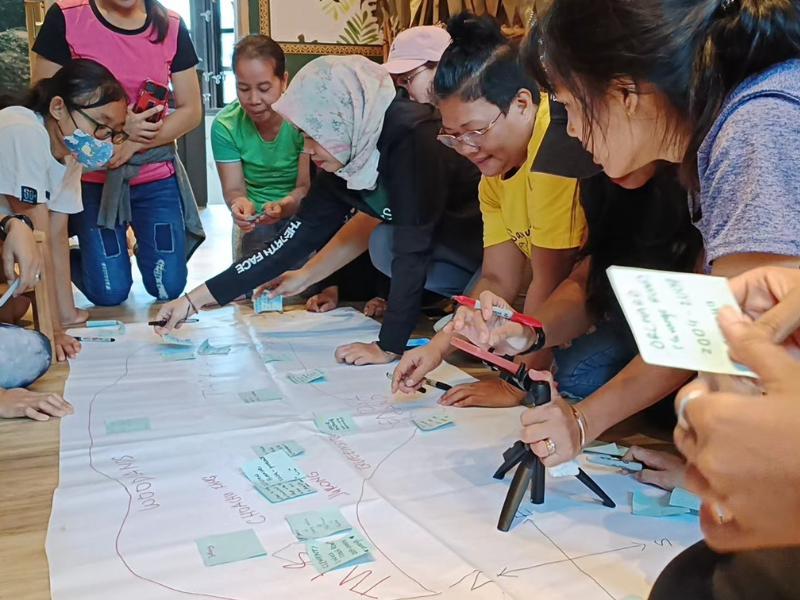Reimagining Community with Migrant Domestic Workers
We (Singaporeans) often think of migrant domestic workers as a singular "other," but at SayurStory, a Singapore-based initiative, we challenge that notion. Here, we dream of bringing people together through a love of nature, food, and creativity, and fostering a community that celebrates the rich diversity of its members.
From gardening and cooking to nature walks and art, our activities connect us to the source of our food and the people around us. But SayurStory goes beyond shared hobbies. We recognize that the identity of a migrant domestic worker is just one thread in the tapestry that defines most members in our community. We are daughters, sisters, wives, and mothers. We come from various homelands across Southeast Asia, each with our unique stories and experiences navigating life in Singapore and the region. These identities are not separate but interwoven, creating a beautiful mosaic of individuals.
SayurStory was born during the pandemic, beginning with an online campaign to encourage migrant domestic workers and their employers to grow tauge (bean sprouts) at home together. This simple act of cultivation revealed a world of diverse culinary practices around the humble tauge, challenging my preconceived notions about food. As the initiator, I too, participated in my own campaign with Auntie, my family’s long-time helper who raised me since I was one. Her expertise in growing and cooking with plants from Southeast Asia has transformed our home, introducing me to ingredients and flavours that I never knew existed. Auntie makes my home feel like home, and I am sure it is the same for countless others whose lives have been uplifted by migrant domestic workers. Their contributions extend far beyond household chores; they enrich our lives with their cultures, knowledge, and unwavering support. Auntie, in particular, has been a second mother to me, shaping my worldview and inspiring my work with SayurStory.
While Auntie’s presence in my home has been an exceptionally prolonged and seemingly “constant” one for a myriad of reasons, I do not take her nor our time together for granted. In the four years since SayurStory's founding, some members have returned home or moved on, while others have become long-term residents of Singapore, having lived here longer than in their respective homelands. This ebb and flow reflects the complex and ever-changing identity of a migrant domestic worker here. Like the individuals who make up our community, SayurStory has constantly evolved.
The "local residents'' involved in organising SayurStory’s activities, too, have diverse cultural backgrounds and relationships with “home” . Some have roots in multiple homelands, and others have lived abroad, shaping their perspectives.
These distinctions become evident during group introductions: I share that I’m a Chinese Singaporean from Malaysia, L explains she is a Singaporean from India, and C might clarify that she is Singaporean too but has a mother from Indonesia. Occasionally, we might even have a student on exchange from a country outside of Asia amongst us. This seemingly simple act of acknowledging our diverse and complex roots highlights the richness within our "local" group who call Singapore “home”.
By recognizing this diversity within our community, we break down the idea of a monolithic "us" versus an "other." SayurStory hopes to become a bridge, a space where cultures may freely exchange and appreciation can flourish.
While bridging personal and cultural differences, SayurStory explores ways to tackle the systemic challenges and injustices faced by migrant domestic workers. We are committed to advocating for their rights and well-being, but the form this advocacy takes is an ongoing conversation with the diverse members of our community. The process requires patience, understanding the strengths and needs of each individual, and an awareness of the different relationships amongst us including power imbalances that manifest in complex ways.
The questions we grapple with at SayurStory are evergreen: How do we define ourselves and others in a shared space? What does "home" mean? We don't have all the answers, but through play, imagination, and an open heart, we strive to reimagine alternative relationships with migrant domestic workers that strengthen mutual respect, reciprocity and solidarity.
The accompanying photos offer a glimpse into Sundays with SayurStory, in reimagined public spaces and landscapes of where we call home. I invite you to reflect on the evergreen questions that I explore in my personal and community lives with SayurStory, none of which we have singular nor definite answers for. I hope our photo essay inspires curiosity and courage in some of you to explore these questions with us.





